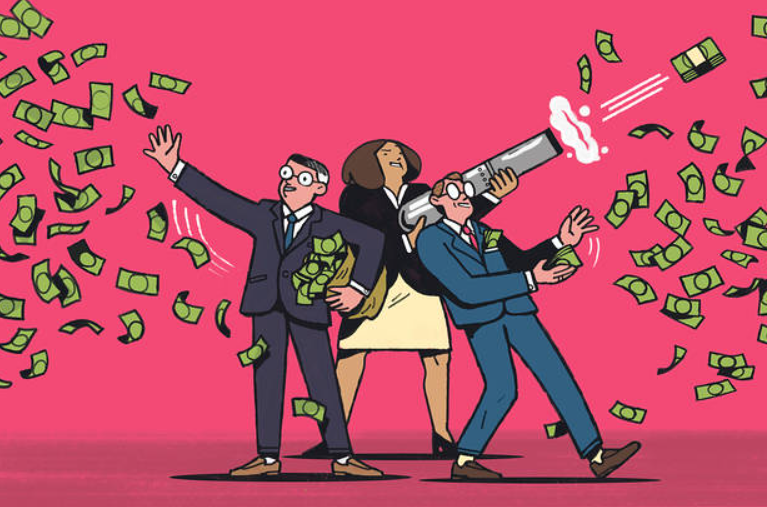Dear valued client,
Markets lost some ground this week as U.S. inflation saw a slight uptick in February, coming in at 3.2% (compared to 3.1% in January and 3.4% in December), surpassing economists’ expectations of 3.1%, according to the recent report from the Labor Department. This marks the second consecutive month of inflation surpassing forecasts, reinforcing the Federal Reserve’s stance on awaiting stabilization before considering interest rate adjustments. Despite the less-than-ideal inflation data, the central bank is anticipated to enact rate cuts later this year. The upcoming meeting next week will provide further insight into the Fed’s deliberations regarding potential rate reductions.
Notable economists from Scotiabank, BMO, and National Bank commented on the state of Canada’s economy this week, expressing growing concerns about the nation’s future trajectory. Derek Holt, Scotiabank’s head of capital markets economics, sparked attention by expressing deep worries about public policy. Joining him in this sentiment, BMO’s chief economist Doug Porter and National Bank strategist Stéfane Marion highlighted troubling trends in domestic productivity, which has seen a consecutive decline for the past three years, a concerning development not seen in over four decades. Marion referenced Nobel laureate Paul Krugman, underscoring the critical role of output per worker in determining a country’s standard of living. Factors contributing to this decline include the rising government payrolls and increased government control in sectors such as healthcare and education. Marion also pointed out declining competitiveness evidenced by portfolio investment flows, with Canadians increasingly investing abroad while foreign investment in Canadian securities dwindles. While these concerns are substantial, it’s essential to consider potential policy interventions and the nation’s inherent strengths, such as a well-educated workforce and commodity wealth, which could mitigate the current economic challenges.
After a lull in 2023, significant stock buybacks are on the table in 2024. Buybacks, which have regained popularity among companies, involve the repurchasing of their own shares from the open market. This strategy, exemplified by Uber’s massive $7 billion buyback, aims to return value to investors by reducing the number of outstanding shares, thereby potentially boosting the company’s stock price. In contrast to paying dividends, which traditionally signaled stability but can raise concerns if discontinued, stock buybacks offer companies a more flexible approach to returning value to shareholders while potentially enhancing stock prices and providing tax advantages to investors. However, the practice has sparked controversy, with critics questioning whether the funds allocated for buybacks could be better utilized to benefit workers or consumers. Despite the debate, long-term studies suggest that companies engaging in buybacks tend to outperform those that do not. For average investors, buybacks can be beneficial, especially when companies generate substantial cash reserves. With major tech firms leveraging buybacks to maintain shareholder satisfaction, the ongoing trend may continue to influence stock market dynamics in the foreseeable future.
Revered Canadian author Margaret Atwood (The Handmaid’s Tale) used the same vocabulary as I did in my email from last week to describe the Liberals’ proposed Online Harms Bill, characterizing it as Orwellian. After having two weeks to scrutinize the draft provisions, prominent voices, including Atwood’s, have emerged, critiquing the bill’s perceived dystopian nature. Atwood specifically raised concerns about a section of the bill that allows for the imposition of peace bonds on individuals who haven’t committed a hate crime but are deemed likely to do so in the future. This provision, granting police authority to impose restrictions based on suspicion rather than actual criminal activity, has sparked considerable debate regarding its implications for civil liberties and due process.
As Russia’s presidential elections unfold this weekend, the outcome appears certain. Given the prevailing climate in which Putin’s opponents have been sidelined, incarcerated, or faced dire consequences, coupled with the limited options available to voters, it is likely that Vladimir Putin will claim another resounding victory. In the past elections, Putin’s official support has consistently increased, with 64% in 2012 and 77.5% in 2018. Given the absence of viable opposition and the perceived atmosphere of intimidation, Putin will likely surpass his previous vote share, potentially claiming 80% of voters’ support. However, it is essential to recognize the limitations of these elections in reflecting genuine popular sentiment amidst allegations of electoral manipulation and suppression of dissenting voices.
“Many forms of Government have been tried, and will be tried in this world of sin and woe. No one pretends that democracy is perfect or all-wise. Indeed it has been said that democracy is the worst form of Government except for all those other forms that have been tried from time to time…” – Winston Churchill
Have a terrific weekend.
PW



